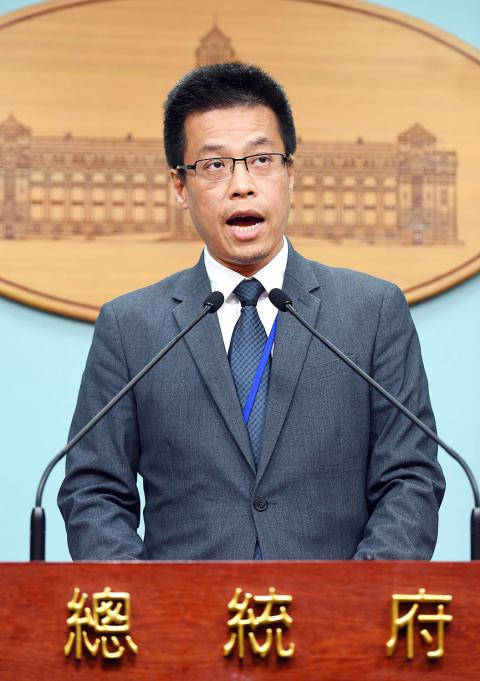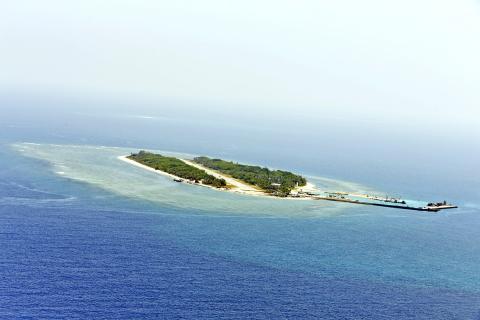Taiwan yesterday refused to accept a ruling by the Permanent Court of Arbitration in The Hague, Netherlands,which included a statement that Taiwan-controlled Itu Aba Island (Taiping Island, 太平島) in the Spratly Islands (Nansha Islands, 南沙群島) is a “rock,” saying the verdict has severely infringed on Taiwan’s rights over the South China Sea island and its surrounding waters.
In the case brought by the Philippines against China over their disputes in the South China Sea, the Philippines argued that land formations claimed by Beijing in the South China Sea are not islands and therefore not entitled to 200 nautical mile (370.4km) exclusive economic zones.
While Taiwan was not party to the case, its claims in the South China Sea are similar to those of China and Itu Aba Island was brought up in testimony during the court hearings.

Photo: Chang Chia-ming, Taipei Times
The international tribunal yesterday concluded that all of the high-tide features in the Spratly Islands, including Itu Aba, are legally “rocks” that do not generate an exclusive economic zone or continental shelf.
“We hereby stress that the Republic of China [ROC] enjoys rights as afforded by international law and the UN Convention on the Law of the Sea over South China Sea islands and their relevant waters,” Presidential Office spokesman Alex Huang (黃重諺) told a news conference following the issuance of the verdict yesterday afternoon.
Huang said that as Taipei was not invited to participate in the arbitration process, nor consulted on its opinion, the government solemnly declares its refusal to recognize the tribunal’s verdict and deems it as carrying no legal effect on the nation.

Photo: EPA
Reiterating the nation’s sovereignty claims over South China Sea islands and their surrounding waters, Huang said the government pledges to steadfastly safeguard the nation’s territory and sovereignty, and would prevent any infringement of its national interests.
“We call for a peaceful resolution of disputes in the South China Sea through multilateral negotiations,” he added.
Shortly after the ruling was issued, President Tsai Ing-wen (蔡英文) convened a high-level government meeting, Huang said, adding that the government has decided to move forward by one day a patrol mission to the South China Sea by a Kang Ding-class frigate originally scheduled for tomorrow.
Minister of Foreign Affairs David Lee (李大維) made an intriguing statement at a news conference at the ministry at 8pm yesterday, saying that while the international tribunal’s categorization of Itu Aba as a “rock” was the worst-case scenario for the government, Tsai would “take action” today.
Asked whether Tsai plans to board the frigate leaving for the South China Sea, Lee said: “I can say no more.”
Reacting to the ruling, Chinese Nationalist Party (KMT) Culture and Communications Committee director Chow Chi-wai (周志偉) said that it was utterly unacceptable and unsatisfactory.
Chow added that the “U-shaped line” representing the nation’s territory in the region covers a total sea area of 3.6 million square kilometers, which is more than 100 times the size of Taiwan.
“We must not relinquish our nation’s strategic interests,” Chow said, urging Tsai to clearly declare the nation’s stance and safeguard its interests.
The line — also known as the “11-dash line” — was featured in the “Location Map of the South China Sea Islands” drawn up by the ROC government in 1947. After the KMT lost the Chinese Civil War and fled to Taiwan, the Chinese Communist Party changed it to a “nine-dash line.”
Saying there is potable water and people living on Itu Aba, KMT caucus secretary-general Lin Te-fu (林德福) urged Tsai to visit the island to formally declare the nation’s sovereignty and show to the world that it is an island.
KMT Legislator Johnny Chiang (江啟臣) said Taiwan is probably “the greatest loser” in the arbitration.
“[China] has fists and countries in the South China Sea will now have an international ruling — even though the ruling is not legally binding — and the US to back their claims, but Taiwan’s island has become a rock overnight,” Chiang said.
KMT Legislator Lai Shyh-bao (賴士葆) advised the government to take “hardline measures,” such as “sending out warships immediately to the area to protect the nation’s territory.”
Former president Ma Ying-jeou (馬英九), who on January 28 visited Taiping Island in an effort to reject the Philippines’ categorization of it as a "rock" and prove to the international community that the island can sustain human habitation and economic life, posted a message on Facebook late yesterday, saying that as are all Taiwanese people, he is extremely astonished and enraged by the ruling.
The People First Party also issued a statement dismissing the ruling, saying the government must refuse to recognize any verdicts or announcements regarding South China Sea islands handed down by international courts based on “hypocritical reasons” or technicalities.
Meanwhile, the American Institute in Taiwan, reiterating its long-standing policy, said the US supports the peaceful resolution of disputes in the South China Sea, including the use of international legal mechanisms such as arbitration.
Additional reporting by Alison Hsiao

Intelligence agents have recorded 510,000 instances of “controversial information” being spread online by the Chinese Communist Party (CCP) so far this year, the National Security Bureau (NSB) said in a report yesterday, as it warned of artificial intelligence (AI) being employed to generate destabilizing misinformation. The bureau submitted a written report to the Legislative Yuan in preparation for National Security Bureau Director-General Tsai Ming-yen’s (蔡明彥) appearance before the Foreign Affairs and National Defense Committee today. The CCP has been using cognitive warfare to divide Taiwanese society by commenting on controversial issues such as Taiwan Semiconductor Manufacturing Co’s (TSMC, 台積電) investments in the

INVESTIGATION: The case is the latest instance of a DPP figure being implicated in an espionage network accused of allegedly leaking information to Chinese intelligence Democratic Progressive Party (DPP) member Ho Jen-chieh (何仁傑) was detained and held incommunicado yesterday on suspicion of spying for China during his tenure as assistant to then-minister of foreign affairs Joseph Wu (吳釗燮). The Taipei District Prosecutors’ Office said Ho was implicated during its investigation into alleged spying activities by former Presidential Office consultant Wu Shang-yu (吳尚雨). Prosecutors said there is reason to believe Ho breached the National Security Act (國家安全法) by leaking classified Ministry of Foreign Affairs information to Chinese intelligence. Following interrogation, prosecutors petitioned the Taipei District Court to detain Ho, citing concerns over potential collusion or tampering of evidence. The

‘COMPREHENSIVE PLAN’: Lin Chia-lung said that the government was ready to talk about a variety of issues, including investment in and purchases from the US The National Stabilization Fund (NSF) yesterday announced that it would step in to staunch stock market losses for the ninth time in the nation’s history. An NSF board meeting, originally scheduled for Monday next week, was moved to yesterday after stocks plummeted in the wake of US President Donald Trump’s announcement of 32 percent tariffs on Taiwan on Wednesday last week. Board members voted to support the stock market with the NT$500 billion (US$15.15 billion) fund, with injections of funds to begin as soon as today. The NSF in 2000 injected NT$120 billion to stabilize stocks, the most ever. The lowest amount it

NEGOTIATIONS: Taiwan has good relations with Washington and the outlook for the negotiations looks promising, Minister of Economic Affairs J.W. Kuo said Taiwan’s GDP growth this year is expected to decrease by 0.43 to 1.61 percentage points due to the effects of US tariffs, National Development Council (NDC) Minister Paul Liu (劉鏡清) said at a meeting of the legislature’s Economics Committee in Taipei yesterday, citing a preliminary estimate by a private research institution. Taiwan’s economy would be significantly affected by the 32 percent “reciprocal” tariffs slapped by the US, which took effect yesterday, Liu said, adding that GDP growth could fall below 3 percent and potentially even dip below 2 percent to 1.53 percent this year. The council has commissioned another institution